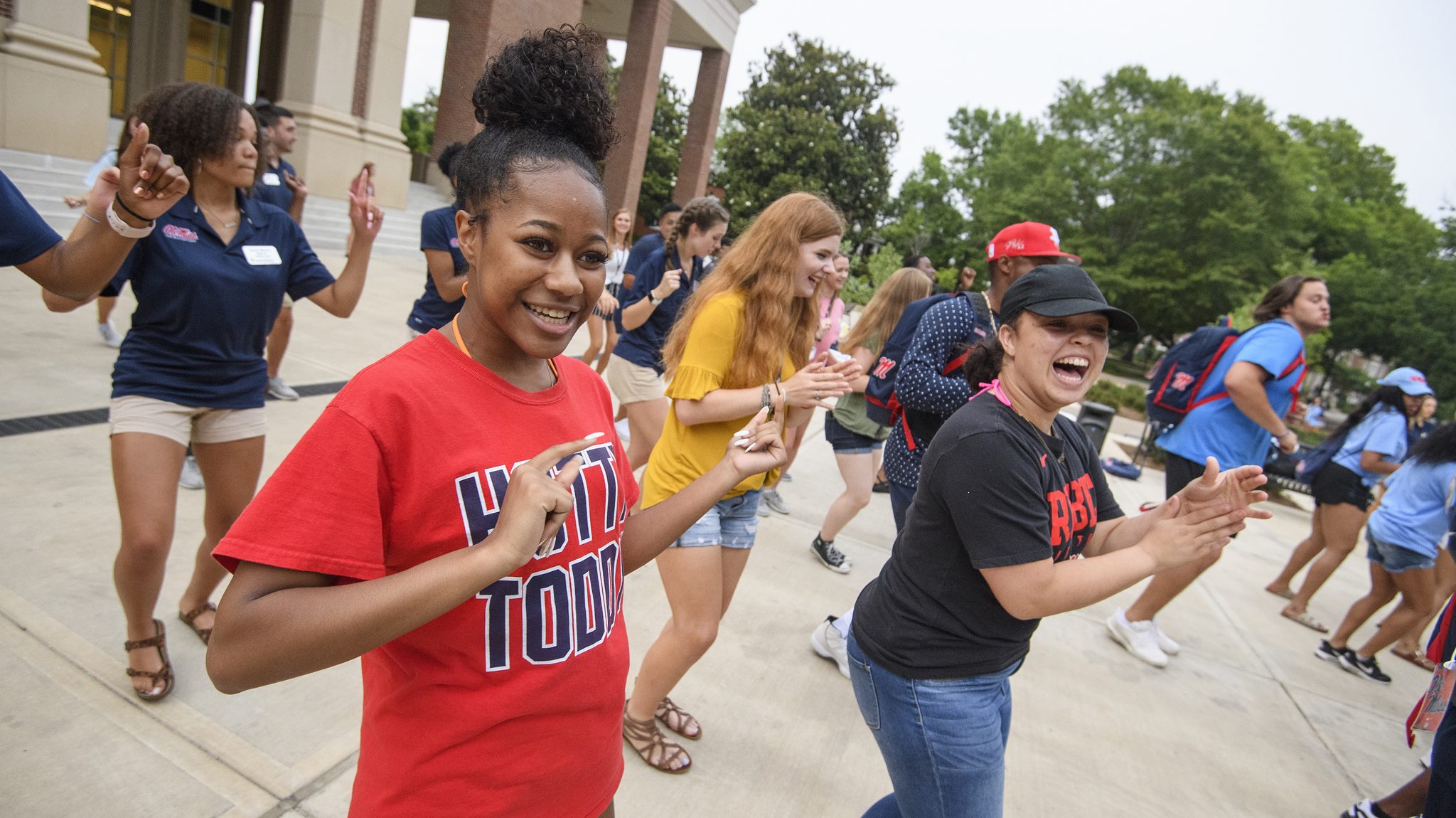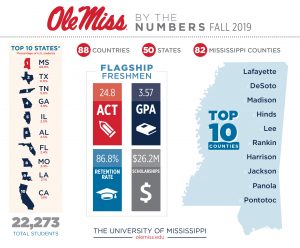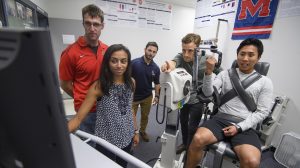
With enrollment finalized for the fall semester, the University of Mississippi’s first-year retention rate is 86.8 percent, a historical high for the Oxford campus and an indicator of the university’s commitment to supporting its students. Photo by Thomas Graning/Ole Miss Digital Imaging Services
OXFORD, Miss. – The University of Mississippi enrolled 22,273 students across its six campuses for fall 2019, based on the official census figure captured Nov. 1. UM continues to attract a geographically diverse student body, with students from all 82 counties in Mississippi, all 50 states, the District of Columbia and 88 countries around the world.
The university’s first-year retention rate is 86.8 percent, a historical high for the Oxford campus and an indicator of the university’s commitment to supporting its students.
In keeping with a procedural change by the university’s governing body, the board of trustees of State Institutions of Higher Learning, UM will report fall enrollment figures in November, rather than in mid-September, to provide a more complete and accurate picture of enrollment. The final enrollment figure of fall 2019 represents a 3.5 percent decline when compared to the final enrollment figure of fall 2018, which was 23,090.
“The University of Mississippi is committed to providing exceptional educational opportunities as well as growth and leadership experiences to support and advance all of our students along their path to success,” Chancellor Glenn Boyce said.
“We recognize that it is a challenging environment to recruit students because of declining numbers of college and university students nationally, and we are addressing this challenge through additional investments in technology, marketing and recruiting. We are proud to offer an unsurpassed learning environment and life-changing student experiences.”
A majority of UM students, 58.3 percent, are Mississippi residents. There are 5,395 students, or 24.2 percent, who are underrepresented minorities. African American enrollment totals 2,788 students, or 12.5 percent of overall enrollment.
UM faculty and staff seeking more information regarding student data are encouraged to visit the Office of Institutional Research, Effectiveness, and Planning.
Next-Generation Rebels
This year’s freshman class includes 3,245 students. First-time students include:
- 114 class valedictorians and salutatorians
- 76 student body presidents
- 52 Star Students
- 94 Eagle Scouts
- 7 Girl Scout Gold Award recipients
The freshman class also includes 60 participants of Mississippi’s Boys State and Girls State, summer leadership and citizenship programs sponsored by the American Legion and the American Legion Auxiliary for high school juniors, respectively.
 The university awarded more than $31.6 million in scholarships to incoming freshmen and transfer students.
The university awarded more than $31.6 million in scholarships to incoming freshmen and transfer students.
The Sally McDonnell Barksdale Honors College enrolled 1,672 students this fall, up 4.7 percent from 1,597 last fall. This includes 401 new Honors College enrollees, with 56.5 percent of them (227 students) being Mississippi residents. The Honors College freshman class posted an average ACT of 31.4 and an average high school GPA of 3.98.
The Honors College includes students from 38 states, as well as Nepal, China, India, Vietnam, Mexico, Venezuela, Nigeria and Australia. Its students span the breadth of the university’s fields of study, representing 78 academic majors.
The Provost Scholars Program, established in 2010, attracts and rewards high-achieving students with special programming and other academic opportunities. This fall, the university enrolled 663 new Provost Scholars with an average ACT of 29.1 and an average GPA of 3.84.
The freshman class also includes 13 recipients of the Stamps Scholarship, one of the largest and most prestigious merit scholarships in the state. Funded through the Stamps Family Charitable Foundation, UM’s new class of Stamps Scholars represents the second-largest group of incoming freshmen recipients attending the 28 Stamps partner universities. The new class brings the total number of Stamps Scholars at UM to 41, making Ole Miss the fourth-largest university in the program.
“We are committed to creating academic experiences that allow all students who enroll at the university to reach their maximum potential,” said Noel Wilkin, provost and executive vice chancellor for academic affairs. “These experiences take place largely in outstanding academic programs that attract students from Mississippi and around the country.
“It is not unusual for the students in these programs to gain national recognition for their accomplishments.”
To learn more about some of these stellar next-generation Rebels, visit https://news.olemiss.edu/category/next-gen-rebs/.
Fostering Success and Upholding a Culture of Caring
The percentage of last year’s first-time students returning to continue their studies this fall, 86.8 percent, reflects the university’s continued focus on investing in and providing a supportive academic environment.
Services to help new students adjust to college life and achieve success include programs such as FASTrack, which builds campus connections through linked classes and one-on-one mentoring. Additional options include living-learning residence hall communities, co-curricular programs and enhanced student leadership opportunities.
The Mississippi Outreach to Scholastic Talent, or MOST, mentoring program helps guide and support incoming and prospective students through the admission process and first year at the university. MOST mentors are current Ole Miss students who are connected with incoming students through the annual MOST Conference, which has hosted more than 1,600 African-American high school seniors from Mississippi over the last five years.
MOST mentors stay in contact with their mentees during the admissions, housing and financial aid processes and assist them with move-in and orientation during the following fall semester. Through online contacts and direct meetings, mentors provide additional support that enables freshmen to establish and maintain a path toward graduation.
Another program is the First-Year Experience within the Center for Student Success and First-Year Experience. The center provides academic advising to about 80 percent of the freshman class and other students who have not declared a major, and it coordinates several first-year student initiatives. It also offers resources targeting the needs of more than 1,400 military-connected students.
The university continues to advance student health and well-being through expanded outreach and educational opportunities. This includes the recent opening of the William Magee Center for Wellness Education with the mission to promote well-informed, healthy choices and set wellness as a goal so that students learn personal habits in an empowering, open and inclusive setting.
The university conferred 5,340 degrees in the 2018-19 academic year on the Oxford and regional campuses – an all-time high for the university and a reflection of its commitment to fostering student success. This includes a record 1,082 STEM degrees and 156 doctoral degrees.
Meeting Demand for Graduate and Professional Education
Enrollment at the UM Medical Center is 2,852 students. The School of Medicine enrolled 168 first-year medical students, which will lead to more physicians serving Mississippians and greater access to health care for more of the state’s residents, particularly in rural areas.
“After several years of growth, we are holding medical school enrollment steady for now,” said Dr. LouAnn Woodward, vice chancellor for health affairs and medical school dean. “Our focus is understanding the health care workforce gaps across the state and growing programs to align with the needs of Mississippi.”
Total UM graduate and professional student enrollment grew to 2,876, including an increase of 52 students in the School of Law.
“We have an outstanding and diverse incoming class of 159 law students from 66 different undergraduate institutions,” said Susan Duncan, the school’s dean. “These students chose a law school ranked nationally for its business law program, practical training and federal judicial clerkship placement, and we’re proud to welcome them to Ole Miss law.”
Serving the Changing Economy and Emerging Fields

UM students work in an applied physiology lab on the Oxford campus as part of coursework within the School of Applied Sciences. Hands-on research is just one of many exceptional educational opportunities students engage in at Ole Miss. Photo by Thomas Graning/Ole Miss Digital Imaging Services
The university continues to enhance and add new programs to address needs in the national and global economies and emerging fields, such as applied gerontology, which recent studies identified as a booming field fueled by a surge in the number of senior citizens.
The School of Applied Sciences debuted the Bachelor of Science in Applied Gerontology last fall, and the program gained full departmental status recently to address a critical need for more skilled practitioners who can manage the aging public’s array of needs across industries, such as health care, law, business, finance and public policy.
Last year, UM was one of two recipients nationally of an Arabic Language Flagship Program, an esteemed designation for undergraduate language programs available only at select higher education institutions. The program is sponsored by the National Security Education Program, a federal initiative seeking to create a wider and better-qualified pool of U.S. citizens with foreign language and international skills.
The Arabic Flagship Program is the second Language Flagship Program at Ole Miss, following the Chinese Language Flagship Program established in 2003. UM has nearly 100 students enrolled in the programs.
“UM is now a de facto hub of critical language learning in America,” said Allen Clark, associate professor of Arabic and co-director of the Arabic Flagship Program. “Because of this, we will be able to recruit a stronger pool of language learners who have the ambition and determination to make positive changes in all sectors – public and private – to include American foreign policy through a well-grounded, balanced view of the developing situation in the Arab region.”
Designed to allow ambitious students opportunities to complete their educational goals faster, the 3+3 Accelerated Law program admits students into a fast-tracked bachelor’s and law degree program, trimming a full year of the time it would take to earn both degrees independently.
This joint degree program offers graduates unique flexibility and an opportunity to pursue special areas such as concentrations in business law, air and space law, sports and entertainment law, and criminal law. Additional benefits include tuition savings and the ability to enter the workforce sooner.
UM and Northwest Mississippi Community College recently launched a new program called Path4 to offer a seamless four-year college experience and an expanded list of services for students.
The new program makes it possible for a student to receive federal funds for tuition at both institutions during the same semester while he or she works toward a degree. With 35 percent of the university’s Mississippi community college transfer students coming from Northwest, the Path4 program also includes a simplified admissions process and coordinated advising to ensure a smooth path to graduation.
“We are thrilled with the energy and potential that our students bring to our campus,” Wilkin said. “Our faculty and staff are committed to offering academic programs that help all students unleash their abilities and passion to pursue educational and career paths that enable them to be successful.
“We know that students thrive in a healthy living, learning and working environment. By ensuring this, we create a stronger culture of academic excellence.”
For more information on enrollment and programs at UM, go to http://www.olemiss.edu.